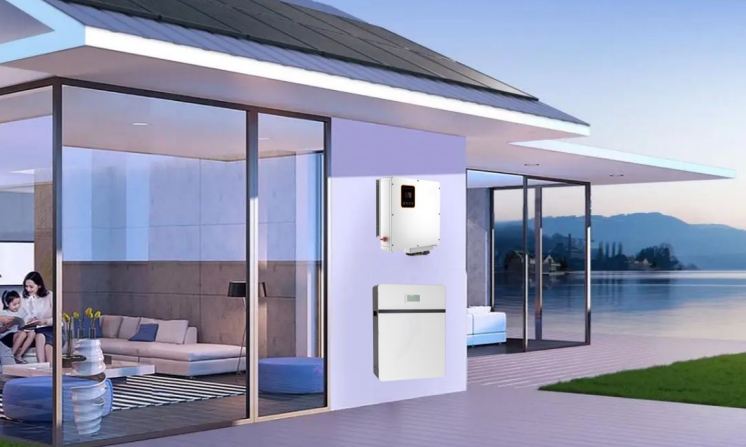What is the role of energy storage inverter?
Sep 24, 2024
In home and commercial energy storage systems, the performance of the energy storage inverter (ESI) directly affects the efficiency, safety and economy of the system as the core hub connecting the battery and the power grid. However, many users still only know about the basic function of inverters, which is "DC to AC". As a company with 12 years of experience in the energy storage field, GreenMore systematically analyzes the core value and selection logic of energy storage inverters from technical principles to application scenarios based on the operating data of more than 200,000 energy storage systems worldwide.
The core functions of energy storage inverter
1. Energy conversion
Bidirectional DC-AC/AC-DC conversion: supports seamless switching of battery charge and discharge modes, and GreenMore inverter conversion efficiency reaches 97.6% (industry average 95.2%)
Wide voltage input range: compatible with 51.2V-800V battery packs, suitable for a full range of products from wall-mounted (51.2V) to commercial energy storage cabinets (800V)
Dynamic response capability: millisecond-level response to grid fluctuations, meeting international grid connection standards such as German VDE-AR-N 4105 and American IEEE 1547
2. Grid interaction
Peak-valley arbitrage algorithm: Combines real-time electricity prices and weather data to automatically execute the "valley electricity storage, peak electricity discharge" strategy, saving a German user more than 42% of their annual electricity bills
Island protection mechanism: When a grid fault is detected, the system disconnects from the grid within 0.02 seconds and switches to off-grid mode to ensure power supply to critical loads
Anti-reverse flow control: accurately limit the power sent back to the grid by PV power generation to avoid triggering grid fines (such as Australia's CEC compliance requirements)
3. Full life cycle monitoring
Three-level fault diagnosis:
Level 1: IGBT module temperature abnormality (warning threshold 85°C)
Level 2: Insulation resistance drops (below 1MΩ triggers alarm)
Level 3: DC arc detection (response time <100ms)
Cloud data analysis: Through the GreenMore EMS platform, the historical operating data of the inverter can be traced and the capacitor aging risk can be predicted 45 days in advance
4. Energy Optimization
Seamless switching between on-grid and off-grid: Supports UPS-level switching (<5ms) to protect sensitive loads such as medical equipment and data centers
Virtual Power Plant (VPP) dispatch: respond to grid frequency regulation instructions and participate in demand response programs (such as the California CAISO market in the United States)
Black start capability: When the grid is completely out of power, use battery energy storage to restart the local microgrid (requires GreenMore commercial energy storage cabinet)
GreenMore Inverter Technical Advantages
Technical Dimension
GreenMore Solutions
Industry Benchmark Comparison
Topology
Three-level module
Two-level IGBT solution
Efficiency curve
97.6% (20%-100% load range)
95.2% (efficiency drops sharply after 50% load)
MPPT efficiency
99.8% (multi-channel independent tracking)
99.2% (single or dual path tracking)
EMC performance
Passed Class A electromagnetic compatibility certification
Most products only reach Class B
Environmental adaptability
35℃~60℃ wide operating temperature range
-20℃~50℃ normal working range
Selection Guide
1. Power matching trap
Overload risk: Inverter rated power must be ≥ load peak power × 1.2 (e.g. air conditioner startup current reaches 3 times rated value)
Expansion redundancy: reserve 20% power margin to cope with future load increase (GreenMore stackable system supports modular upgrade)
2. Protocol compatibility black hole
Battery communication protocol: ensure support for mainstream protocols such as CAN/RS485/Modbus (the entire GreenMore series is compatible with third-party BMS)
Grid dispatching protocol: needs to adapt to local grid rules (such as Australia AS4777.2, China GB/T 34120)
3. The fog of energy efficiency indicators
Recognize the "peak efficiency" trap: focus on EU Efficiency or California Efficiency (CEC) weighted values
Nighttime standby power consumption: High-quality inverters have a standby power consumption of <8W (low-quality products can reach over 30W)
Analysis of typical application scenarios
Scenario 1: Home solar storage system (German case)
Configuration:
5kWp photovoltaic + 8kWh wall-mounted battery + 5kW GreenMore hybrid inverter
Strategy:
During the day: PV power supplies the load first, and the remaining power is stored in the battery
At night: the battery is discharged to SOC 20%, and recharged to 80% during off-peak hours
Benefits:
The annual self-use rate increased to 92%, saving €1,200/year in electricity bills
Scenario 2: Industrial and commercial microgrid (US case)
Configuration:
200kWp photovoltaic + 300kWh commercial energy storage cabinet + 100kW GreenMore industrial and commercial inverter
Strategy:
Participate in CAISO frequency modulation market, response speed <200ms
Demand-based electricity charge management, reducing basic electricity charges by 18%
Benefits:
Project ROI shortened from 6.2 years to 4.1 years
Energy storage inverters are not only energy conversion devices, but also "energy routers" in the era of smart grids. GreenMore has helped global users reduce system losses by 23% and extend battery life by 40% through its self-developed NPC+SiC hybrid topology, AI fault prediction algorithm and other core technologies. Visit the official website www.gmsolarkit.com now to get customized solutions. Let every kilowatt-hour of electricity accurately match your energy needs and jointly usher in a new era of zero-carbon smart energy.



 Network Supported
Network Supported